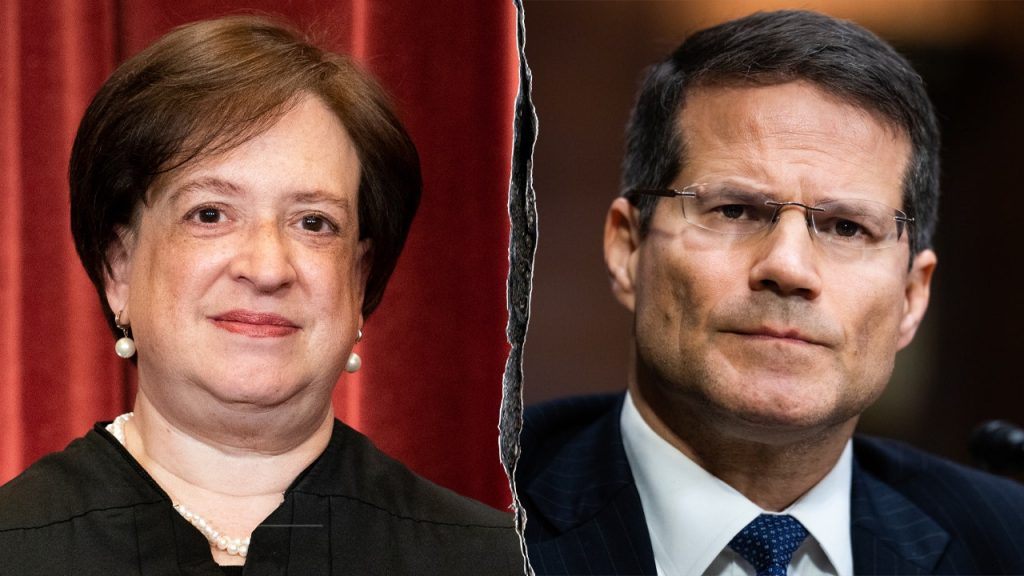In a pivotal session held on Thursday, Justice Elena Kagan scrutinized U.S. Solicitor General John Sauer regarding the complexities associated with the termination of universal injunctions. This case, which has garnered national attention, zeroes in on the issue of birthright citizenship and the extent of lower courts’ authority over the executive branch. As discussions unfolded, Kagan highlighted the Trump administration’s consistent losses in lower court rulings on matters relating to birthright citizenship, indicating the ongoing judicial scrutiny and challenges faced by the current administration.
| Article Subheadings |
|---|
| 1) The Role of Universal Injunctions |
| 2) The Birthright Citizenship Debate |
| 3) Supreme Court’s Involvement |
| 4) Implications for the Trump Administration |
| 5) The Future of Judicial Authority |
The Role of Universal Injunctions
Universal injunctions serve as powerful judicial tools that allow courts to prevent government actions that could violate constitutional rights on a nationwide scale. While proponents argue that such injunctions are critical for protecting vulnerable communities, critics, including members of the current administration, contend they can lead to chaos in the judicial system. Recently, Justice Elena Kagan pressed Sauer on how curtailing these universal injunctions would affect the legislative process and the ability of affected parties to seek justice. Her inquiries raise important questions about the balance of judicial power and executive authority in the current political climate.
The Birthright Citizenship Debate
At the center of the ongoing legal discussions is the contentious issue of birthright citizenship. Under the 14th Amendment, all children born in the U.S. are granted citizenship regardless of their parents’ immigration status. However, the Trump administration has challenged this interpretation, seeking to reinterpret the amendment. This legal battle has led to widespread repercussions, with various lower courts issuing national injunctions against the executive order, which would deny citizenship to children born in the U.S. if their parents are in the country unlawfully. The debate has evoked strong emotions on either side, making it a leading issue in the ongoing national discourse on immigration.
Supreme Court’s Involvement
The Supreme Court agreed to hear the case concerning the birthright citizenship executive order earlier this year. This decision signals the high court’s acknowledgment of the need to address the growing tension between judicial review and executive authority. Sauer‘s presentation attempted to clarify the administration’s rationale; however, Justices like Kagan expressed skepticism regarding the administration’s legal strategy. As the case unfolds, the Supreme Court’s final ruling will not only impact specific legal interpretations but may also set a precedent for future cases challenging executive actions.
Implications for the Trump Administration
The outcomes of these legal proceedings present significant implications for the Trump administration’s policy agenda. The current legal climate reflects a series of defeats for the administration in lower courts, demonstrating the robust checks and balances inherent to the U.S. judicial system. As noted by Kagan, lower courts have ruled against the government in numerous related cases, indicating increasing judicial resistance to executive overreach. The administration must navigate these adverse rulings as they can ultimately shape immigration policies and other executive policies moving forward.
The Future of Judicial Authority
The discussions surrounding universal injunctions and birthright citizenship could shift the perception and role of judicial authority in governance. A ruling from the Supreme Court could redefine how and when courts may intervene in executive actions, potentially curtailing or expanding their authority. As legal experts anticipate the court’s decision, many recognize that the implications could reverberate across various legal contexts, affecting how citizens interact with governmental policies and raising questions about the future of civil rights protections in an evolving political landscape.
| No. | Key Points |
|---|---|
| 1 | Justice Elena Kagan rigorously questioned Solicitor General John Sauer on the complexities surrounding universal injunctions. |
| 2 | The case centers on the contentious issue of birthright citizenship as outlined in the 14th Amendment. |
| 3 | The Supreme Court’s decision is poised to set a significant legal precedent affecting future executive actions. |
| 4 | The Trump administration has faced numerous defeats in lower courts regarding its immigration policies. |
| 5 | The ruling’s implications may extend beyond this case, influencing various aspects of judicial authority and civil rights protections. |
Summary
The ongoing legal debates involving universal injunctions and birthright citizenship have significant implications for the Trump administration’s policies and the judicial landscape in the United States. As Justice Elena Kagan highlighted in her interactions with Solicitor General John Sauer, the challenges faced by the administration in lower court rulings emphasize the vital role of the judiciary in overseeing executive power. The anticipated Supreme Court ruling will not only influence this specific case but also redefine the boundaries of judicial authority in future executive actions.
Frequently Asked Questions
Question: What are universal injunctions?
Universal injunctions are court orders that prohibit government actions affecting entire populations, ensuring civil rights are protected consistently across jurisdictions.
Question: How does the Trump administration aim to reinterpret the 14th Amendment?
The administration seeks to redefine the amendment’s application regarding citizenship, specifically denying it to children born in the U.S. to parents who are unlawfully present.
Question: What impact could a Supreme Court ruling have on future cases?
A Supreme Court ruling could set a significant legal precedent that influences how lower courts manage challenges to executive actions, thereby reshaping the boundaries of judicial oversight.


